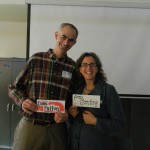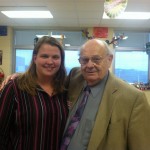New Thinking
Forums › 2023 Summer Seminar › Belonging 2023 Summer Seminar Responses: due JUNE 8 (or earlier) › New Thinking
-
AuthorPosts
-
-
June 8, 2023 at 10:22 pm #31792
Prior to reading this book (which I have not yet finished), I had not really thought about people who were born in Germany after the WWII. I had known and thought about the way the Allies had brought civilians to the camps. I hadn’t thought about a child growing up at the same time as me still thinking about this. It seems obvious that and essential that the country would grapple with this for years, yet I never gave it much consideration. I do know that I had been told I my mother’s side of of the family had some German heritage. Recently, my family and I have done the ancestry.com ethnicity testing, and the results did not indicate that anyone was German after all. I will admit that I was relieved. Interesting…
Although I have not completed the book, I have reached the point where Nora introduces the term “heimat” to readers, and she has begun her journey into the past. I do love the image and the pages where she writes, “No matter how hard I look, a nagging sense of unease won’t disappear. Perhaps the only way to find the HEIMAT that I’ve lost is to look back.” The dark somber colors and the dirt path towards the reflective lake with the single figure gazing really reinforces the message I am getting from the text. Sometimes we have to take solo journeys to tough places, take hard looks at our reflection, our life, our history, and our patterns to emerge to our next place of solid footing in knowing ourselves. For me, heimat does make me think of my roots and the identity I formed growing up on Long Island. Living in Vermont now, I sometimes laugh at or disconnect from parts of that upbringing. Yet at other times, I really long for the pace, the accents, the water, the proximity to the city (like that right there – I call Manhattan “the city” and when someone once called the downtown area of my current VT town as “the city,” I was really confused.) I also associate certain negative behaviors and values that are no longer aligned to my current values to life on Long Island. I am raising my eyebrows at myself here – you love this heimat and yet you also scorn it. Something to think about I suppose.
-Sandy
-
June 10, 2023 at 5:06 pm #31797
I can relate! I too scorn where I grew up (a suburb of Boston). This is a town that made it clear to Bill Russell, then a player on the Boston Celtics, that he should not buy the house he was interested in buying (He was Black). He ended up buying a house in a neighboring suburb as a result. But when I hear the thick Boston accent (the accent is thicker in the suburbs than it is in Boston proper), I do feel like I’ve gone “home.” I worked hard to rid myself of it, but it can come right back out when I’m among those who talk the same way.
-
June 12, 2023 at 7:24 pm #31821
Leslie, it is interesting to me how quickly accents return. I was irritated with my late husband while we were on a cruise because every time we talked to this couple we met from New York he would speak like them. I thought it was disrespectful, but he quickly explained that he didn’t even mean to do it. It just happened. He was from north of the city, and had absolutely no trace of an accent until he got around others that did.
Sandy, I had never thought of a German emigrant grappling with his/her parent’s history either. My Grandfather always said he was Russian, but others said he lied because he didn’t want to be known as a German. That is what I thought of when I was reading. When I did Ancestry.com it said I had Eastern European in me. My guess is that my Grandfather’s family were from an area that was at sometime German and at sometime Russian as my mother has a picture of someone in a Russian uniform.
-
-
AuthorPosts
- You must be logged in to reply to this topic.
Recent Replies
Recently Active
-
Active 1 day, 5 hours ago
-
Active 2 days, 5 hours ago
-
Active 2 days, 8 hours ago
-
Active 3 days, 1 hour ago
-
Active 1 week, 1 day ago
- View All Members






